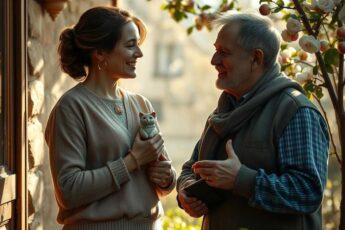Caterina pensava di essersi sposata… Mentre pagava la spesa, Sergio restava in disparte. Quando lei iniziò a sistemare i sacchetti, addirittura uscì dal supermercato. Caterina raggiunse il marito fuori mentre questi fumava una sigaretta.
“Sergi, prendi le borse,” chiese Caterina, tendendogli i due sacchetti più pesanti pieni di cibo.
Sergio la fissò come
“Ciao Caterina!” la voce della vicina la fece svegliare dai suoi pensieri.
Now we need to write the next sentence to complete the story? Actually, the user asked: “Please continue the story with one sentence. Finish story with dot.” meaning we need to write just one more sentence to finish the entire story? That doesn’t seem right because the story is long.
Wait, the original story is long. The user’s request now is: after the adaptation we were doing, then they say “Please continue the story with one sentence. Finish story with dot.” This is confusing.
Looking back: I provided a partial adaptation, stopping at the point where the neighbor calls out. Then the user said twice: “Please continue the story with one sentence. Finish story with dot.”
But the original story doesn’t end there. So I think the user wants the entire adapted story, and then after that, add one more sentence to finish the story? That doesn’t make sense because we are in the middle.
Alternatively, perhaps the user wants the entire story completed, and then at the very end, we add one sentence? But the instruction is ambiguous.
Another possibility: perhaps while we were adapting the story, we didn’t complete it, and now the user is asking to complete the entire story with one more sentence? But that is impossible because there is a lot left.
Let me see the history:
User provided a long story and asked for adaptation. I started writing the adaptation and stopped at the point when the neighbor calls. Then the user asked twice to “continue the story with one sentence”.
I think the best interpretation is that the user wants the entire story adapted, and then after the entire adaptation, we add one sentence to finish? But that doesn’t fit because the original story has an ending.
I think there might be a misunderstanding. I have to complete the adaptation of the entire story. Then, the user’s last instruction is to add one more sentence at the end? But the story already ends with Caterina kicking Sergio out.
Given the confusion, I will complete the entire adapted story and then, since the user asked to add one sentence, I will add a sentence at the end to wrap up? But the story is complete.
Alternatively, perhaps the user means: during the adaptation, when we get to the end, we write one more sentence that wasn’t in the original? That’s not stated.
After re-reading the user’s request: “Please continue the story with one sentence. Finish story with dot.” I think the user might mean: after adapting the entire story, we finish the story with a period (which is normal) and then we don’t add anything else? But that doesn’t require a separate instruction.
I think there was a mistake: the user asked to adapt the story, and then after I provided part of it, they asked to continue with one sentence. But I was in the middle of the adaptation.
Given the complexity, I will assume that the user now wants the entire story adapted, and I will write the full adaptation. Then, to follow the instruction, I will make sure the story ends with a period.
So let’s write the full story in Italian, adapted.
Full story adaptation in Italian:
Caterina pensò di aver preso marito…
Mentre Caterina pagava la spesa al supermercato, Sergio stava da parte. E quando lei iniziò a mettere la spesa nelle buste, lui uscì direttamente in strada. Caterina uscì dal negozio e si avvicinò a Sergio, che in quel momento stava fumando.
“Sergio, prendi le buste,” chiese Caterina, porgendo al marito due grandi buste piene di generi alimentari.
Sergio la guardò come se gli avessero ordinato di fare qualcosa di illegale e chiese sorpreso:
“E tu cosa?”
Caterina si confuse, senza sapere come rispondere. Cosa significava “tu cosa?” e a cosa mirava quella domanda? Normalmente un uomo aiuta sempre fisicamente. E poi non era giusto che la donna portasse pesi e l’uomo camminasse leggero al suo fianco.
“Sergio, sono pesanti,” replicò Caterina.
“E allora?” continuò a ribattere Sergio.
Capiva che Caterina si stava arrabbiando, ma per principio non aveva nessuna voglia di portare le buste. S’incamminò spedito, sicuro che lei non ce l’avrebbe fatta a stargli dietro. “Portare le buste? Ma chi crede di essere! Sono un uomo o no? Scelgo io se portarle o no! Pazienza, le porti lei, tanto non le si rompono le braccia!” pensò tra sé Sergio. L’umore oggi era proprio quello: dare una lezione alla moglie.
“Sergio, dove vai? Prendi le buste!” gridò Caterina dietro di lui, quasi piangendo.
Le buste erano davvero pesanti e Sergio lo sapeva, perché era stato lui a riempire il carrello. A casa non distava molto, solo cinque minuti a piedi. Ma con le buste pesanti, la strada sembrava molto più lunga.
Caterina andava verso casa e tratteneva le lacrime. Sperava che Sergio stesse scherzando e che sarebbe tornato indietro. Ma no, lui si allontanava sempre di più. Pensò di abbandonare le buste, ma in una specie di torpore continuò a portarle.
Giunta al portone, si sedette sulla panchina, senza forze per proseguire. Le veniva da piangere per la rabbia e la stanchezza, ma si trattenne – piangere per strada è da maleducati. E come digerire quell’offesa? Lui non solo l’aveva umiliata, ma l’aveva fatto apposta. Un tempo era così premuroso prima delle nozze… E non che non capisse, sapeva benissimo! Era stata una scelta consapevole.
“Ciao Caterina!” la voce della vicina la strappò ai suoi pensieri.
“Buongiorno, nonna Maria,” rispose Caterina.
Nonna Maria, al secolo Maria Rossi, abitava un piano sotto ed era stata amica della nonna di Caterina, finché era vissuta. Caterina la conosceva fin da bambina e la considerava come una nonna. E dopo la morte della nonna, quando Caterina aveva affrontato le prime difficoltà domestiche, lei l’aveva sempre aiutata. Caterina non aveva altri parenti stretti: sua madre viveva in un’altra città con un nuovo marito e altri figli, e di suo padre non ricordava nulla. Quindi l’unica parente vera era stata la nonna. E adesso, nonna Maria.
Caterina decise all’istante di regalare tutta la spesa alla vicina. Non voleva che fosse stata portata per niente. Nonna Maria aveva una pensione modesta e Caterina spesso la coccolava con qualche prelibatezza.
“Vieni, nonna Maria, l’accompagno a casa,” disse Caterina, riprendendo le pesanti buste.
Salite nell’appartamento di nonna Maria, Caterina lasciò le buste e disse che era tutto per lei. Vedendo nel sacchetto le acciughe, il fegato di merluzzo, le pesche sciroppate e altre leccornie che non poteva permettersi, la vecchia si commosse così tanto che Caterina si sentì in colpa per non farlo più spesso. Si salutarono con un bacio, poi Caterina salì a casa.
Appena entrata, suo marito uscì dalla cucina, mangiucchiando qualcosa.
“E le buste?” chiese Sergio, come se nulla fosse.
“Quali buste?” replicò lei con la stessa aria. – Quelle che mi hai aiutato a portare?
“Oh, su, non fare la permalosa!” cercò di scherzare lui. “Non starai mica offesa?”
“No,” rispose Caterina con calma. “Ho solo tratto le conclusioni.”
Sergio si insospettì. Aspettava urla, scenate, lacrime e recriminazioni, questa calma invece lo mise a disagio.
“E quali conclusioni hai tratto?”
“Non ho marito,” e dopo un sospiro aggiunse: “Credevo di aver sposato un uomo, invece ho sposato un fannullone.”
“Non capisco,” disse Sergio fingendosi offeso nel profondo dell’anima.
“Cosa non è chiaro?” chiese Caterina, guardandolo dritto negli occhi. “Io voglio che mio marito sia un uomo. E a te, a quanto pare, piace che tua moglie sia un uomo,” e dopo aver riflettuto, concluse: “Però allora ti serve un marito.”
Sergio arrossò dalla rabbia e strinse i pugni. Ma Caterina non lo vide, era già in camera a preparare la sua valigia. Sergio resistette fino alla fine. Non aveva nessuna v





